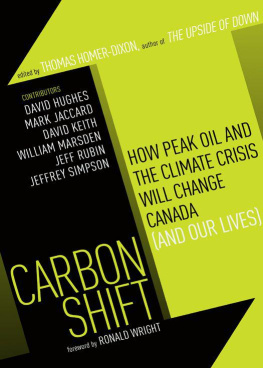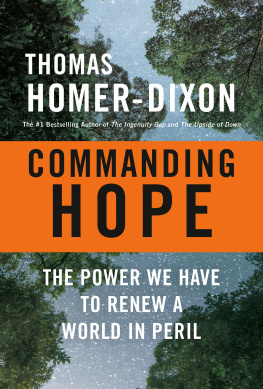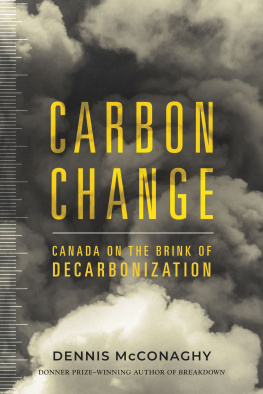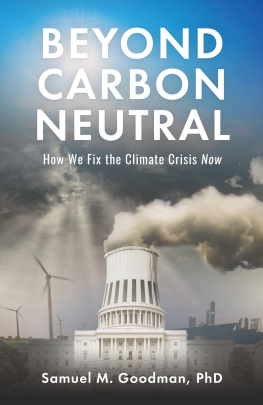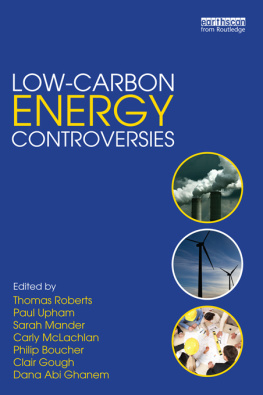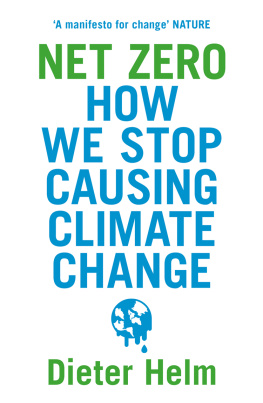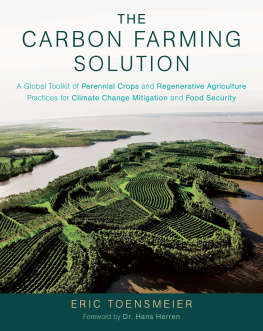Thomas Homer-Dixon - Carbon Shift: How Peak Oil and the Climate Crisis Will Change Canada (and Our Lives)
Here you can read online Thomas Homer-Dixon - Carbon Shift: How Peak Oil and the Climate Crisis Will Change Canada (and Our Lives) full text of the book (entire story) in english for free. Download pdf and epub, get meaning, cover and reviews about this ebook. year: 2010, publisher: Vintage Canada, genre: Romance novel. Description of the work, (preface) as well as reviews are available. Best literature library LitArk.com created for fans of good reading and offers a wide selection of genres:
Romance novel
Science fiction
Adventure
Detective
Science
History
Home and family
Prose
Art
Politics
Computer
Non-fiction
Religion
Business
Children
Humor
Choose a favorite category and find really read worthwhile books. Enjoy immersion in the world of imagination, feel the emotions of the characters or learn something new for yourself, make an fascinating discovery.
- Book:Carbon Shift: How Peak Oil and the Climate Crisis Will Change Canada (and Our Lives)
- Author:
- Publisher:Vintage Canada
- Genre:
- Year:2010
- Rating:5 / 5
- Favourites:Add to favourites
- Your mark:
- 100
- 1
- 2
- 3
- 4
- 5
Carbon Shift: How Peak Oil and the Climate Crisis Will Change Canada (and Our Lives): summary, description and annotation
We offer to read an annotation, description, summary or preface (depends on what the author of the book "Carbon Shift: How Peak Oil and the Climate Crisis Will Change Canada (and Our Lives)" wrote himself). If you haven't found the necessary information about the book — write in the comments, we will try to find it.
Carbon Shift: How Peak Oil and the Climate Crisis Will Change Canada (and Our Lives) — read online for free the complete book (whole text) full work
Below is the text of the book, divided by pages. System saving the place of the last page read, allows you to conveniently read the book "Carbon Shift: How Peak Oil and the Climate Crisis Will Change Canada (and Our Lives)" online for free, without having to search again every time where you left off. Put a bookmark, and you can go to the page where you finished reading at any time.
Font size:
Interval:
Bookmark:

Thomas Homer-Dixon is the Chair of Global Systems at the Balsillie School of International Affairs in Waterloo and is a professor in the Centre for Environment and Business at the University of Waterloo. He is the author of The Ingenuity Gap: Can We Solve the Problems of the Future?, which won the Governor Generals Literary Award for Non-Fiction, and The Upside of Down: Catastrophe, Creativity, and the Renewal of Civilization, which was a Globe and Mail Best Book and won the National Business Book Award. www.homerdixon.com
Contributors: David Hughes, former senior geoscientist with the Geological Survey of Canada; Mark Jaccard, professor at Simon Fraser Universitys School of Resource and Environmental Management and a member of the Intergovernmental Panel on Climate Change; David Keith, Canada Research Chair at the University of Calgary in Energy and the Environment; William Marsden, award-winning investigative reporter and author of the bestselling Stupid to the Last Drop: How Alberta Is Bringing Environmental Armageddon to Canada (And Doesnt Seem to Care);Jeff Rubin, former chief economist at CIBC World Markets; and Jeffrey Simpson, Globe and Mail national columnist and author, with Mark Jaccard, of Hot Air: Meeting Canadas Climate Change Challenge.
With a foreword by Ronald Wright, author of A Short History of Progress and What Is America? A Short History of the New World Order.

Introduction and Conclusion Copyright 2009 Resource & Conflict Analysis Inc.
Foreword Copyright 2009 Ronald Wright
Dangerous Abundance Copyright 2009 David Keith
The Energy Issue: A More Urgent Problem than Climate Change?
Copyright 2009 John David Hughes
Peak Oil and Market Feedbacks: Chicken Little versus Dr. Pangloss
Copyright 2009 Mark Jaccard
Demand Shift Copyright 2009 Jeff Rubin
The Perfect Moment Copyright 2009 William Marsden
Broken Hearts, Broken Policies: The Politics of Climate Change
Copyright 2009 Jeffrey Simpson
VINTAGE CANADA EDITION, 2010
All rights reserved under International and Pan-American Copyright Conventions. No part of this book may be reproduced in any form or by any electronic or mechanical means, including information storage and retrieval systems, without permission in writing from the publisher, except by a reviewer, who may quote brief passages in a review.
Published in Canada by Vintage Canada, a division of Random House of Canada Limited, Toronto, in 2010. Originally published in hardcover in Canada by Random House Canada, a division of Random House of Canada Limited, Toronto, in 2009. Distributed by Random House of Canada Limited, Toronto.
Vintage Canada with colophon is a registered trademark.
www.randomhouse.ca
LIBRARY AND ARCHIVES CANADA CATALOGUING IN PUBLICATION
Carbon shift : how peak oil and the climate crisis will change Canada (and our lives) / edited by Thomas Homer-Dixon with Nick Garrison.
eISBN: 978-0-307-37212-3
1. Petroleum reservesForecasting. 2. Petroleum industry and tradeForecasting. 3. Global warming. 4. Climatic changes. 5. Energy policy. 6. Carbon dioxide mitigation. I. Homer-Dixon, Thomas, 1956 II. Garrison, Nick
QC 981.8. G 56 C 372 2010 333.823211 C 2009-905331-4
v3.1
FOREWORD
Ronald Wright is an award-winning novelist, historian and essayist. He is the author of ten books, including the #1 bestsellers Time Among the Maya and Stolen Continents. His first novel, A Scientific Romance, won Britains David Higham Prize for Fiction and was chosen a Book of the Year by the Globe and Mail, the Sunday Times, and the New York Times. His book A Short History of Progress (the 2004 CBC Massey Lectures) won the CBA Libris Award for Non-Fiction Book of the Year and has been published worldwide in more than a dozen languages. His most recent book, What Is America? A Short History of the New World Order, was a #1 national bestseller.
Civilizations are built on knowledge, populationand energy. They thrive only when a good balance is struck between these three, a balance dependent (like that of a bicycle) on motion, which is to say on growth. Human successes are always taken from the past or borrowed from the future: sooner or later the bike runs out of road. The first humans evolved by devouring the great wild beasts that once roamed all parts of the Earth. When they exhausted this primordial energy hoard at the end of the last ice age, they starved; and the humble survivorsour ancestorsbecame more and more dependent on plants.
Over time, early civilizations arose with the development of systematic agriculture. Through crop breeding, animal husbandry, deforestation and irrigation, they concentrated the energy of soil and seeds into the muscle power of domesticated animals and equally domesticated human beings. Towns, cities, governments and priesthoods rose like pyramids on a broadening agrarian base. Despite booms and busts along the way, humanity grew at an ever-increasing rate, especially after the crops of the Americas (such as maize and potatoes) spread around the world. By some two hundred years ago, human beings had reached the maximum number who could feed themselves by muscle power and pre-industrial machinery. That number was about one billion.
What has allowed us to soar nearly sevenfold since then was not any breakthrough in new food: all our crops are ancient; we have raised yields by tinkering, but we have developed no new staples from scratch since prehistoric times. The breakthrough was in energyin finding new ways to use the vast stocks of fossil carbon that Nature had buried under the planets skin long before the first mammal crawled upon it.
We tend to think of the looming energy crisis in terms of cars, factories, heating and air conditioning, but the first thing to keep in mind is that fossil fuels are feeding us. We all know that coal and oil drive the tractors, trains, trucks, ships and freezers that grow, store and move food from farm to city, nation to nation. But how many are aware that we have literally been eating oil and gas for more than a hundred years? Fossil carbon is a prime ingredient of the artificial fertilizers that have sidestepped the decline of natural fertility each time a crop is taken off a field. A two-century carbon binge has allowed mankind to fill its planet way beyond the natural carrying capacity for feckless, reckless, self-indulgent apes. If we run out of carbon or fail to find good substitutes, we are back to dung and muscle power. Billions will die.
An absolute shortage of fossil energy is still a long way off. But the amount that can be easily, cheaply and above all safely exploited is indeed running low. Because of carbon dioxides effect on climate, an abundance of carbon fuelespecially in its dirtier forms such as coal and tar sandis far more dangerous than a dearth. Long before fossil fuel gets truly scarce, its consumption will overthrow the predictable weather patterns on which all farming has relied for the past ten thousand years. In short, the industrial carbon economy has turned out to be what I call a progress trapa seductive and seemingly benign development which, upon reaching a certain scale, becomes a dead end.
Font size:
Interval:
Bookmark:
Similar books «Carbon Shift: How Peak Oil and the Climate Crisis Will Change Canada (and Our Lives)»
Look at similar books to Carbon Shift: How Peak Oil and the Climate Crisis Will Change Canada (and Our Lives). We have selected literature similar in name and meaning in the hope of providing readers with more options to find new, interesting, not yet read works.
Discussion, reviews of the book Carbon Shift: How Peak Oil and the Climate Crisis Will Change Canada (and Our Lives) and just readers' own opinions. Leave your comments, write what you think about the work, its meaning or the main characters. Specify what exactly you liked and what you didn't like, and why you think so.

